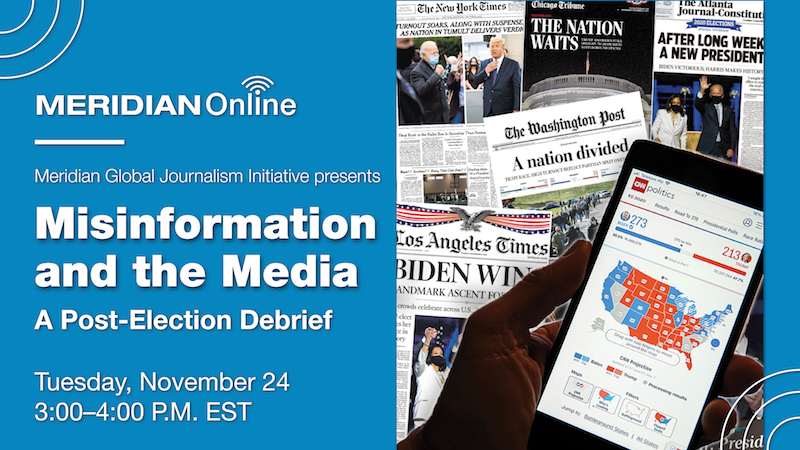Misinformation and the Media: A Post-Election Debrief
On November 24th Meridian hosted virtual discussion on the rise of social media and its influence on journalism, civic discourse and the global information marketplace with speakers:
- Joie Chen, Senior Adviser & Faculty for Poynter Institute, and broadcast journalist
- Yael Eisenstat, Visiting Fellow at Cornell Tech, formerly Facebook's Global Head of Elections Integrity Ops for political ads, White House advisor, and diplomat
- Ben Smith, New York Times media columnist
Top takeaways from the conversation:
- RETURN OF REPORTERS AS GATEKEEPERS. While everyone was concerned about the 2020 U.S. election misinformation circulating on social media, traditional reporters didn’t need tech platforms to block content. New York Times media critic Ben Smith pointed out that traditional media often administers elections by communicating information about the process, calling out what is true or unproven, and eventually calling a victory. Social media companies made many mistakes between this election and the coronavirus, and journalists were playing hall monitor for them by questioning unverified or false information circulating on the platforms.
- CONTENT BLOCKING WAS A BAND-AID. Journalists and social media companies alike prepared for the 2020 U.S. election like it was 2016, focusing on external factors like foreign interference and missing the big picture. The primary source of the 2020 election mis- and disinformation were domestically present ‘bad players’ whose aims were to further divide the electorate and undermine public trust in the election process. Traditional media over-learned the lessons of 2016 and saw that play out with the unfounded New York Post article on Hunter Biden, whereas social media and tech companies responded one month before the election by vetting every single piece of content, after allowing mis- and disinformation to spread unchecked for the last four years. Yael Eisenstat, Visiting Cornell Tech Fellow and former White House advisor and diplomat, said the companies failed to address the systemic issue of the social media ecosystem, which exploits human behavioral data and uses amplification and engagement tools to target certain groups with certain information.
- CIVIC DISCOURSE WILL IMPROVE OFFLINE. According to Eisenstat, social media is detrimental to civil discourse because of the way social media is constructed and monetized, making it next to impossible for people to have genuine conversations in the fast-paced, frictionless environments of these platforms. Talking and listening to people with different perspectives is a key part of the hearts and minds work of diplomacy that builds consensus on shared challenges or goals, even when there is disagreement. Eisenstat believes getting off social media will help improve civic discourse, along with more media literacy efforts like MediaWise and the International Fact Checking Network that Poynter Institute’s Joie Chen championed.
- GOVERNMENT MUST REGULATE. Eisenstat believes that social media and tech companies will not live up to their responsibility of being huge information providers, and thus governments must get involved. Australia and some European countries have attempted to make Facebook and Google pay for news, but not without challenges. While there is no blanket solution given the local and political nuances, governments must step in to increase transparency around the engines’ targeting tools that allow vulnerable communities to receive false and misleading information and political advertising practices, for example, while also defining the companies’ responsibility and liability, including antitrust.
- “IT'S NOT ALL GOOD OR BAD, otherwise we would have solved this by now,” said Eisenstat. The globalization of information carries both risks and benefits. Bad actors have always used propaganda and information warfare, and social media is the latest tool to spread ideas and views in a cheaper, more targeted way, says Eisenstat. On the other hand, social media has provided a place for a more robust global conversation on human rights. Smith shared how Western journalists reporting on Iraq today will get called out by Iraqis on Twitter – “that never happened during the Iraq War.”
This program is part of the new Meridian Global Journalism Initiative, which builds on our 20-year history of international journalism work while strengthening our commitment to democracy, global security and combating the spread of misinformation and disinformation in the U.S. and around the world.
Project summary
| Misinformation and the Media: A Post-Election Debrief | November 2020 | |
|---|---|
| Regions: | Europe and Eurasia, Western Hemisphere |
| Countries: | United States |
| Impact Areas: | Media and Journalism |
| Program Areas: | Diplomatic Engagement |
